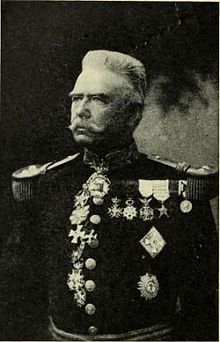Théophile Wahis
| Théophile Wahis | |
|---|---|

Portrait photo of Wahis, c.1908
|
|
| Governor-General of the Belgian Congo | |
|
In office 15 November 1908 – 20 May 1912 |
|
| Monarch |
Leopold II (1908–09) Albert I (1909–12) |
| Preceded by | None (post created) |
| Succeeded by | Félix Fuchs |
| Governor-General of the Congo Free State | |
|
In office 21 December 1900 – 15 November 1908 |
|
| Monarch | Leopold II |
| Preceded by | Émile Wangermée (acting) |
| Succeeded by | None (post abolished) |
|
In office 26 August 1892 – 4 September 1896 |
|
| Preceded by | Camille Janssen |
| Succeeded by | Émile Wangermée (acting) |
| Personal details | |
| Born |
27 April 1844 Menen, Belgium |
| Died | 26 January 1921 (aged 76) Brussels, Belgium |
Lieutenant-General Baron Théophile-Théodore Wahis (1844–1921) was a Belgian soldier and colonial civil servant who served as Governor-General of the Congo Free State and, subsequently, the Belgian Congo for two terms between 1891 and 1912. He was the longest ruling of Belgian colonial governors.
Wahis was born in Menen in Belgium in 1844 to a military family. He entered the Belgian Army and studied at the Royal Military Academy in Brussels. During the Franco-Mexican War (1864–67), Wahis volunteered for service in the Belgian Legion sent to Mexico to fight alongside French and Imperial Mexican Forces. Wahis served with distinction in Mexico, returning to the Belgian military in 1867 but was frustrated by the lack of promotion. Through General Alfred van der Smissen, the former commander of the Belgian Legion in Mexico, Wahis was introduced to King Leopold II as a possible candidate for the king's private venture in the Congo Free State.
In 1890-91, Wahis was posted to Boma as a senior civil servant in the Free State administration. His success in the role led to rapid promotion and, in 1892, he was designated the state's next Governor General, replacing Camille Janssen. Wahis' military background had a strong influence on governance in the Free State and contributed to its increasingly harsh policies of rule. He clashed particularly with more liberal colonial figures, such as Félix Fuchs and Félicien Cattier whose own backgrounds were as civilian lawyers. According to historians Lewis H. Gann and Peter Duignan, Wahis' appointment "symbolized the increasingly exploitative nature of the Free State's administration" and the growing "Belgianization" of the colony's administration.
...
Wikipedia
